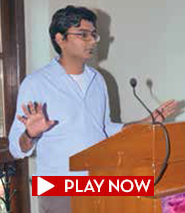
Quasar Thakore Padamsee
Quasar Thakore Padamsee
 Quasar Thakore Padamsee is a director, producer, trainer and an avid watcher of all things theatrical. He is currently the Artistic Director of the theatre and arts management company QTP, a passionate crusader of ensuring that theatre remains in the public consciousness. Internationally, Quasar has worked on Tim Supple’s spectacular production of A Midsummer Night’s Dream, the aerial dramaMind Walking and numerous other collaborations.
Quasar Thakore Padamsee is a director, producer, trainer and an avid watcher of all things theatrical. He is currently the Artistic Director of the theatre and arts management company QTP, a passionate crusader of ensuring that theatre remains in the public consciousness. Internationally, Quasar has worked on Tim Supple’s spectacular production of A Midsummer Night’s Dream, the aerial dramaMind Walking and numerous other collaborations.
At last week’s meeting, he shared the story of Indian theatre with Rotarians. He said, “Today, I am here to talk about young theatre in new India. I am a product of the young theatre and love everything about it.
I am also a theatre director in my own right, but I am here today to talk about something I am incredibly passionate about. I am here as a promoter of youth theatre. As the country has grown and so many things have changed over the years, so has the arts world, particularly in the 18 to 25 “Theatre in the ’90s was sporadic. There were hardly any groups doing anything, and I mean this about Bombay as it is a good template to represent theatre in India. None of them was welcoming to young people interested in theatre, there were very few venues and plays were usually about middle-aged men and women and the scripts were always adapted from Western plays. Most importantly, they happened only on the weekend and audiences were dwindling because quite simply, they were dying out. Then television happened and everybody decided that theatre was done with.”
Quasar was only just starting out in theatre at the time the television revolution almost entirely wiped out theatre in India and he shared his struggle with Rotarians. “I was beginning to feel the pressure to compete with satellite television and it was in this scenario that my love affair with youth theatre began. It happened in a dark auditorium in St. Xavier’s College. There must have been only 20 of us in the audience. I was there only because I was a part of the competition and slated to go next. The play on stage, Sadiya, was absolutely brilliant and we realised we did not stand a chance. The lingering feeling was why is this work that’s so good, that deserves to be staged in any theatre in any part of the country, in an auditorium with just 20 people?
“A friend and I then hatched a plot as to how we could bring college theatre out of auditoria and shine a light on it. How do we provide young people, who clearly have the skills, the talent and the passion, and give them a simulation of what professional theatre is all about, give them a level playing field with the senior groups. In hindsight, we were empowered by the arrogance of the newly liberal India. However, a week later, a festival called Thespo was started, which still exists, and it is specifically for people under the age of 25; to recognise, encourage and promote young work,” he explained.
He also shared Thespo’s journey since it was founded. He said, “The first Thespo play was staged in 1999. It was the first time young theatre moved out of the college circuit and into the public sphere. December 10, 2014 is exactly 16 years since that day. The festival still exists and since then, it has grown much larger than even we had imagined.”
